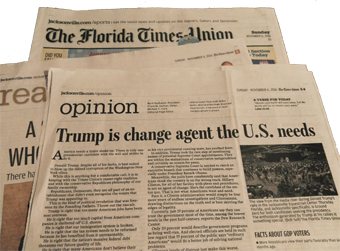
photo courtesy of Thursday Review
The Florida Times-Union Endorses Donald Trump
| published November 6, 2016 |
By Thursday Review staff writers
The Jacksonville-based Florida Times-Union, one of the oldest newspapers in the Sunshine State, has endorsed the presidential candidacy of businessman Donald Trump, making the Florida newspaper one of the few major dailies to back Trump in a year in which many newspapers are casting their support for Hillary Clinton, or choosing to remain editorially neutral in the 2016 election.
In its Sunday endorsement of Trump, the paper outlines its belief that Trump is an agent for genuine change in Washington, a city which almost all voters in both parties agree is broken and effectively gridlocked by partisanship and outside lobbying.
“America needs a major shake-up,” the editorial page reads. “There is only one presidential candidate with the will and the ability to do it.” The endorsement, which appears on the paper’s editorial page, goes on to tell readers that Trump “despite his faults, is best suited to blow up the inbred corruption” of Washington and New York. The piece goes on to suggest that the endorsement is in keeping with the center-right philosophy of both the Times-Union and its parent company, the Augusta, Georgia-based Morris Communications.
But the endorsement by The Times-Union has come with controversy from within; according to sources familiar with the internal workings of the TU, few on the editorial staff and even fewer among those who serve on the editorial board actually support Trump. Though many top TU staffers and editors would prefer to avoid engaging in any form of endorsement for any of the presidential candidates, the decision comes from the newspaper’s owner, William S. Morris, President and CEO of Morris Communications. (Aside from the Florida Times-Union, Morris Communications owns other daily, weekly and monthly newspapers, as well as magazines and holdings in outdoor communications).
Some in media circles in northeast Florida—especially those who have spoken to editors and reporters who work at the Times-Union—say that only a relatively small percentage of the editorial staff of the newspaper support Trump. The editorial decision to endorse Trump, therefore, may be an unpopular one within the offices and the newsroom.
In its endorsement, the paper admits the decision was not an easy one, but stresses that the alternative—another four years of gridlock—is not a good option for the United States. The editorial also stresses that despite his missteps and mistakes, Trump has soothed fears of some conservatives through several decisions, including his selection of Mike Pence as running mate, and his recent gesture of naming some of the people he may be considering for future Supreme Court appointments.
Still, the paper’s endorsement of Trump may seem to some observers to clash with the newspaper’s perceived pattern in recent years of hiring generally liberal or progressive reporters, no matter how journalistically neutral those reporters may be in approaching the task each day of gathering fresh news and writing articles which inform the public.
Newspaper owners sometimes maintain political views which may differ sharply from editorial boards, editors and staff, and how the views of owners are synthesized into the editorial content of the newspaper can differ from one newspaper to another to another, though many media companies make an effort to keep their corporate opinion detached from the newsroom itself. Indeed, on the Sunday front page of the TU, owner Morris stressed that the company’s “newsrooms run independently from our editorial pages.” Morris also suggested that differences of opinion can make newspapers healthier, and that all voices should be added to the political conversation.
Some political experts suggest that endorsements of candidates by newspapers have very little effect on the outcome of elections. Other political analysts disagree, suggesting that in some elections—especially those in which a large percentage of voters are undecided or unsure—endorsement by an influential newspaper or publication can have a decisive effect.
Either way, the presidential election of 2016 has had the overall effect of creating confusion and spurring uncertainty and frustration among voters generally dissatisfied with the quality of any of the major candidates. Trump won his party’s nomination despite the fact that a majority of Republican voters cast their ballots for other people; Trump won, however, a plurality of votes cast during the primaries and caucuses, challenging the GOP status quo but offending many along the way. Clinton won only after a complex and bruising fight with the progressive wing of her Democratic Party, a task made especially difficult because of a challenge from Vermont Senator Bernie Sanders.
The Times Union acknowledges that, according to surveys conducted by Pew Research, about half of all Republicans are voting for Trump to prevent Hillary Clinton from getting elected (conversely, some polls show that about half of those who support Clinton are doing so to block Trump from getting elected). CBS News recently reported that at least 82% of all voters express some form of dissatisfaction with all the presidential candidates.
In October, the Las Vegas Review-Journal became one of the first major daily newspapers to endorse Trump.
Related Thursday Review articles:
Emails: Clinton Foundation Brass Lobbied State Dept on Behalf of Donors; Keith H. Roberts; Thursday Review; August 29, 2016.
White House: FBI Director in a "Tough Spot"; Thursday Review staff writers; Thursday Review; November 1, 2016.
